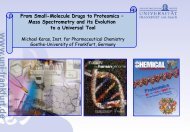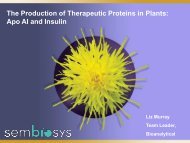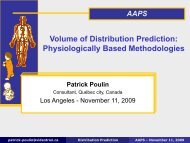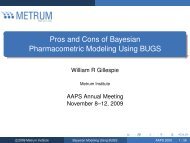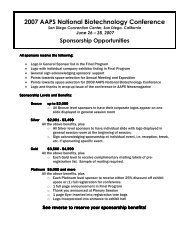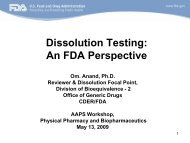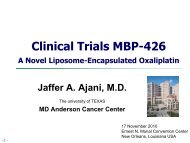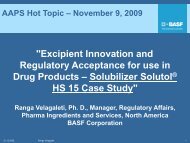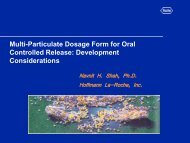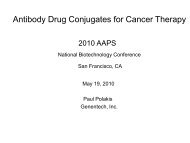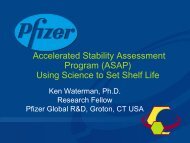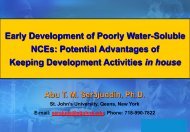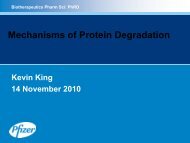Preliminary Program - American Association of Pharmaceutical ...
Preliminary Program - American Association of Pharmaceutical ...
Preliminary Program - American Association of Pharmaceutical ...
Create successful ePaper yourself
Turn your PDF publications into a flip-book with our unique Google optimized e-Paper software.
68<br />
2009 AAPS Annual Meeting and Exposition<br />
AAPS Pharmacokinetics, Pharmacodynamics and Drug Metabolism (PPDM) <strong>Program</strong>ming<br />
TUESDAY MORNING ROUNDTABLES<br />
9:00 am – 11:00 am<br />
To Test or Not to Test? Risk Assessment<br />
Approaches for Human Metabolites<br />
Roundtable<br />
This session is intended to take the U.S. Food and<br />
Drug Administration Guidance on Safety Testing <strong>of</strong><br />
Drug Metabolites to the next logical step by focusing<br />
on strategic approaches for risk assessment <strong>of</strong> major<br />
and unique human metabolites. Currently, many<br />
companies have accepted the guidance, but are at<br />
a loss for how to implement its recommendations<br />
in the real world <strong>of</strong> drug development. Industry<br />
speakers will present case studies that did<br />
and did not result in stand-alone nonclinical<br />
safety assessment <strong>of</strong> a human metabolite. The<br />
presenters will also address inherent issues with<br />
conducting risk assessment on metabolites that are<br />
administered directly to an animal instead <strong>of</strong> formed<br />
in situ by normal metabolic processes. Finally, a<br />
U.S. Food and Drug Administration representative<br />
familiar with this area will address situations where<br />
actual metabolite safety testing can be instrumental<br />
in deconvoluting toxicity observed in the clinic. The<br />
roundtable should be very interactive as audience<br />
members are likely to provide their own perspectives<br />
and experiences on this hot topic.<br />
Moderators<br />
Debra Luffer-Atlas, Ph.D.<br />
Eli Lilly and Company<br />
K. Sandy Pang, Ph.D.<br />
University <strong>of</strong> Toronto<br />
Addressing Metabolite-related Safety<br />
Concerns in Early Development<br />
William G. Humphreys, Ph.D.<br />
Bristol-Myers Squibb<br />
Complicating Factors in Risk Assessment <strong>of</strong><br />
Drug Metabolites<br />
Shelby Anderson, Ph.D.<br />
Eli Lilly and Company<br />
A Regulatory Perspective on Characterizing<br />
Human Metabolites<br />
Aisar Atrakchi, Ph.D.<br />
U.S. Food and Drug Administration<br />
TUESDAY AFTERNOON ROUNDTABLES<br />
Funded by a Grant from<br />
2:00 pm – 4:00 pm<br />
Inclusion <strong>of</strong> Women in Clinical Trials<br />
and Drug Development — How Far Have<br />
We Gone<br />
Roundtable<br />
Women were initially excluded from clinical research<br />
due to liability concerns and historical precedence.<br />
The result was the “male norm” <strong>of</strong> research.<br />
Research subjects were predominately men since<br />
most researchers thought men and women were<br />
biologically the same except for their reproductive<br />
organs. By the 1980’s, it was clear that the exclusion<br />
<strong>of</strong> women from clinical studies compromised the<br />
health care they received. This created a scientific<br />
knowledge gap that has resulted in health care<br />
disparity for women over the past many years.<br />
Sex affects health and health care; the following<br />
examples illustrate why it is imperative that<br />
diseases and treatments be studied for the different<br />
effects they can have on women and men. A 2001<br />
report from the General Accounting Office (GAO)<br />
on the U.S. Food and Drug Administration (FDA)<br />
revealed that eight <strong>of</strong> 10 drugs recently withdrawn<br />
from the market caused more adverse events in<br />
women than men. Heart disease kills 500,000<br />
<strong>American</strong> women each year, over 50,000 more<br />
women than men, and strikes women, on average,<br />
10 years later than men. Women are 2.7 times more<br />
likely to acquire an autoimmune disease, such as<br />
multiple sclerosis, lupus or rheumatoid arthritis.<br />
Women wake up from anesthesia an average four<br />
minutes before men do.<br />
Moderator<br />
Emmanuel O. Fadiran, R.Ph., M.S., Ph.D.<br />
U.S. Food and Drug Administration<br />
Inclusion <strong>of</strong> Women in Clinical Trials & Drug<br />
Development — Regulatory Perspectives<br />
Ameeta Parekh, Ph.D.<br />
U.S. Food and Drug Administration<br />
Inclusion <strong>of</strong> Women in Clinical Trials & Drug<br />
Development — Clinical Perspectives<br />
C. Noel Bairey Merz, M.D.<br />
Cedars-Sinai Medical Center, UCLA<br />
Inclusion <strong>of</strong> Women in Clinical Trials and Drug<br />
Development — Industry Perspectives<br />
Poornima Sood, M.D.<br />
Abbott Laboratories<br />
TUESDAY AFTERNOON SYMPOSIA<br />
2:00 pm – 4:30 pm<br />
Reactive Metabolites in Drug Discovery<br />
and Development: How Can We Handle<br />
the Risk?<br />
Symposium<br />
Safety-related issues continue to significantly<br />
contribute to the overall attrition statistics in the<br />
pharmaceutical industry. The metabolic formation <strong>of</strong><br />
reactive metabolite intermediates in vivo represent a<br />
risk in the drug discovery and development process<br />
which can manifest itself as drug-induced toxicity<br />
later on in patients as unforeseen idiosyncrasies.<br />
Significant advances in our knowledge <strong>of</strong><br />
biotransformation pathways over the last 20 years<br />
have resulted in a better understanding <strong>of</strong> the<br />
underlying chemical mechanisms, which drive the<br />
formation <strong>of</strong> reactive intermediates. An increasingly<br />
integrative approach <strong>of</strong> medicinal chemistry,<br />
computational chemistry, biology and toxicology<br />
holds the promise that academic and industry<br />
research has become more capable <strong>of</strong> designing<br />
out unwanted toxicity risks from drug candidates,<br />
which will ultimately lead to safer drugs for patients.<br />
The present symposium will discuss the current<br />
state <strong>of</strong> the art in reactive metabolite (RM) research<br />
regarding compound design, RM detection, RM<br />
toxicological implications and RM risk assessment in<br />
drug development.<br />
Moderators<br />
Raimund M. Peter, Ph.D.<br />
AstraZeneca<br />
Dhiren Thakker, Ph.D.<br />
University <strong>of</strong> North Carolina at Chapel Hill<br />
Chemically-induced Toxicity: Concepts<br />
Frederick P. Guengerich, Ph.D.<br />
Vanderbilt University<br />
Reactive Metabolites: Biological and<br />
Pharmacological Consequences<br />
B. Kevin Park, M.D., Ph.D.<br />
University <strong>of</strong> Liverpool<br />
Chemical Toxicophores: Potential for Trouble<br />
Amit Kalgutkar, Ph.D.<br />
Pfizer Global Research & Development<br />
Structure/Toxicity Relationships in Reactive<br />
Metabolite-mediated Drug Toxicities<br />
Sidney D. Nelson, Ph.D.<br />
University <strong>of</strong> Washington<br />
Reactive Metabolites: Risk Management in<br />
Discovery & Development<br />
David C. Evans, Ph.D.<br />
Johnson & Johnson <strong>Pharmaceutical</strong> Research &<br />
Development, L.L.C



